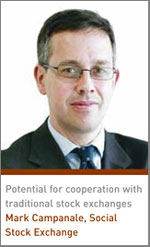Imagine a stock market where making a positive social or environmental impact is as important as making a profit
As a young investment banker, Robert Kraybill believed he was helping the world by making the capital markets more efficient. Then the global financial crisis of 2008 came along and shook that belief.
Making a profit and doing good for the world have often been at odds. Imagine a stock exchange, however, where issuers have a duty not only to deliver financial returns but also to make a positive social or environmental impact. ‘Social stock exchanges can make the world a better place, which goes back to what I thought capital markets should be doing all along,’ says Kraybill, managing director of Impact Investment Exchange Asia (IIX).
‘Social stock exchanges can make the world a better place, which goes back to what I thought capital markets should be doing all along,’ says Kraybill, managing director of Impact Investment Exchange Asia (IIX).
At least one such stock exchange, with all the transparency, accountability and secondary trading that the definition implies, is ready to launch in 2012.
Less regulated social investment networks, some of them new, some of them long-standing, are growing fast and may become real exchanges, too.
The London-based Social Stock Exchange (SSE) will be regulated by the Financial Services Authority and has ambitions of listing up to 200 companies within five years.
Its founders are Pradeep Jethi, formerly a new product development manager at the London Stock Exchange (LSE), and Mark Campanale, who was an SRI specialist at Henderson Global Investors.
In fact, the distinction of being the first regulated social stock exchange goes to the iX. The Stock Exchange of Mauritius launched it in May 2011 in conjunction with Nexii, an African impact-investing group with ties to Tamzin Ractliffe, who started the South African Social Investment Exchange (SASIX) in 2006.
Going back even further, the progenitor of the idea is considered to be the Bolsa de Valores Sociais (BVS), a platform for charitable donations created in 2003 within Bovespa, Brazil’s stock exchange.
Its founder, Celso Grecco, is now said to be pushing the BVS toward becoming a true, regulated board.
Other examples include the Global Exchange for Social Investment, the UNDP-sponsored South-South Human Development Investment Exchange, and the Kenya Social Investment eXchange, which was also launched in May 2011.
Standard setters
IIX launched Impact Partners as a private placement platform in early 2011, and is said to be working toward approval as a public exchange in 2012.
Alongside Kraybill, a 20-year veteran of investment banking with the likes of Morgan Stanley and Credit Suisse, IIX’s other founder is Durreen Shahnaz, whose resume includes stints at Merrill Lynch, the World Bank and Grameen Bank.
‘Creating an exchange is about transparency of financial returns and business results but it’s also about transparency in terms of social and environmental impacts,’ Kraybill says.
‘One of the key reasons to have a dedicated social exchange is to be able to set higher standards of social and environmental disclosure.’
Like others in the space, IIX is working through structural questions such as whether it should be a fully regulated exchange or more of a junior market like the LSE’s Alternative Investment Market (AIM) or Singapore Exchange’s Catalist. For the SSE, Campanale wants to insert a social mission into the ‘DNA’ of listed companies and the exchange itself, ‘so that companies can protect their social mission and ethos, and can’t be diluted either by the exchange’s rules or by investors.’ The SSE has ‘top-up’ listing rules that include such social objectives.
For the SSE, Campanale wants to insert a social mission into the ‘DNA’ of listed companies and the exchange itself, ‘so that companies can protect their social mission and ethos, and can’t be diluted either by the exchange’s rules or by investors.’ The SSE has ‘top-up’ listing rules that include such social objectives.
Companies that are already listed elsewhere may seek a secondary listing on the SSE – like Good Energy Group, for example, which is listed on PLUS Stock Exchange. Campanale also suggests there is the potential for cooperation with traditional exchanges like the LSE and AIM.
Unlike most of the so-called social stock exchanges, which are private placement platforms or philanthropy networks, the SSE is focused on broker-led IPOs and full listings open to institutional investors. To begin with, the SSE is concentrating on companies with market capitalization of less than £10 mn ($15 mn).
Social ventures
In the US, Mike Van Patten’s Mission Markets is also said to harbor aspirations of becoming a true exchange. The youngest of the species is the Social Venture Exchange (SVX), a local, online platform in Ontario, Canada that is ready to launch in early 2012.
Even though it has backers including TMX Group, which runs the Toronto Stock Exchange, and is getting approval from the Ontario Securities Commission, the SVX is careful not to label itself an ‘exchange’ because it doesn’t allow actual trading.
Like Mission Markets, it’s more of an online dating service where introductions can be made before any actual deals take place, off-line and in private. The SVX’s vision is straightforward: ‘Mobilizing private capital for public good,’ says founder Adam Spence.
Interestingly, SVX drew inspiration from alternative markets for private companies like SecondMarket, SharesPost and CapLinked. ‘We looked at their technology as well as their standards of privacy and investor protection,’ Spence says. ‘We want to make sure we have a trusted, highly secure platform for people.’
Spence initially imagined the SVX as a fully regulated stock market. Instead it will start out as a ‘matchmaker’ while working toward the day when it can be a fully fledged exchange with secondary market trading and retail investor access.
For TMX Group, supporting the SVX is an impact investment – in impact investing. ‘We have a strong sense of community and care deeply about societal issues in Canada,’ says Kevin Doyle, director of corporate strategy at TMX Group.
‘We have a genuine interest – even a financial interest – in seeing small firms grow, and that’s what MaRS, which is launching SVX, stands for. It’s part of our exchange ecosystem.’
Beyond SRI‘Impact investments: an emerging asset class’, a November 2010 report from JPMorgan in partnership with the Rockefeller Foundation, marked the coming of age of a new way of looking at investing: creating positive impact beyond financial return.This is different from the well-established field of socially responsible investing (SRI), which generally screens out negative impacts rather than proactively seeking out social or environmental benefits. JPMorgan foresees the impact-investment market growing to between $400 bn and $1 tn in sectors ranging from clean water to microfinance and affordable housing, generating profits of $180 bn to $600 bn or more. Robert Kraybill, managing director of Impact Investment Exchange Asia, says to think of it as investing in a business with a social mission. ‘And I mean investing – not philanthropy or making a donation,’ he explains. ‘Investors should expect at least the return of their principal and perhaps even a positive risk-adjusted return.’ As Mark Campanale, co-founder of the Social Stock Exchange (SSE), explains, impact investors ‘are drawn to businesses that put social value creation on an equal footing with financial return.’ The sector is still dominated by pioneering microfinance investment groups such as Geneva-based BlueOrchard, which manages around $1 bn, India’s Aavishkaar and foundations or high-net-worth individuals. But mainstream institutions are also starting to explore impact investing, which is ‘mushrooming’, according to Kraybill. The next step will be to give individual investors access, which is a big motivator behind exchanges like the UK’s SSE. The Rockefeller Foundation has been a huge force behind many developments in the impact-investing space, including the development of social stock exchanges. |










